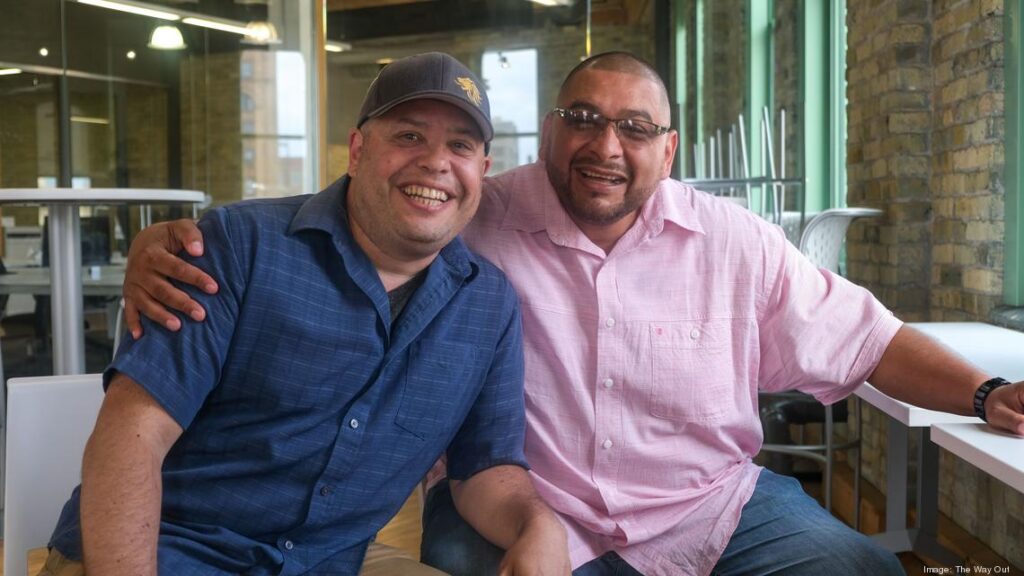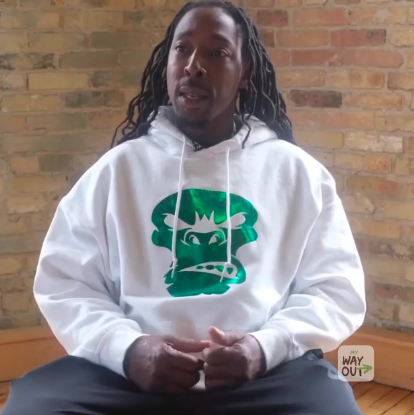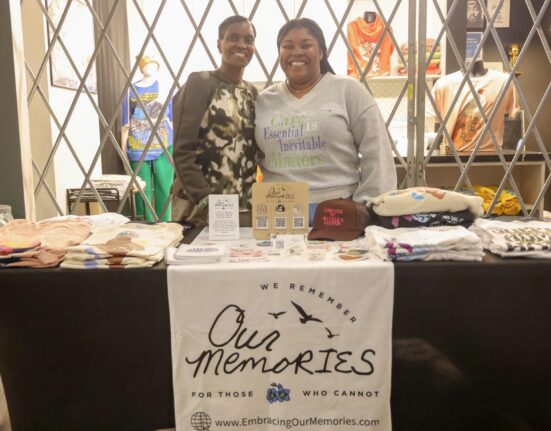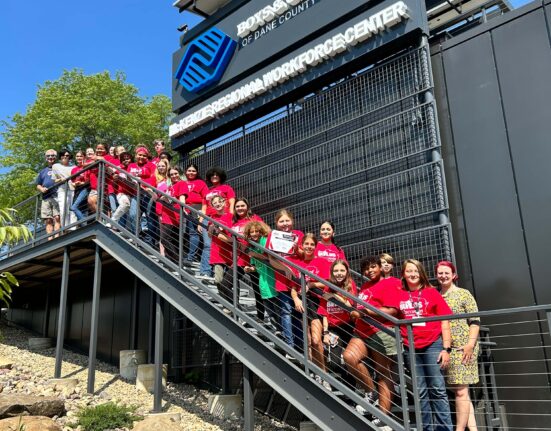
Taron Brooks has always loved dogs. His first, when he was just a kid, was named Satin.
His job, then, is a nearly perfect fit. As operations manager at Dogtopia, a doggy daycare, groomer and kennel on Milwaukee’s east side, he oversees about 30 human employees and more than 90 dogs.
“My day to day is basically making sure that chemicals are filled, dogs are cared for, crates and housings are maintained, supply inventory is up to date, food and toys are disinfected and prepared accordingly. All medications are accounted for and dispensed accordingly. All of the puppy supplies when they come in and sleep over are all labeled and put away properly,” he said in an interview last month. He also helped launch the business, coming on board about a year ago, six months before the business opened.

And six months before that? He was in prison.
Brooks, now in his early 40s, entered state custody at 17. He spent nearly 20 years away from dogs in various state correctional facilities, until he enlisted in a program at Oshkosh Correctional Institution where inmates helped train service dogs. For nearly three years, he trained dogs who went on to work in therapy and service for veterans and others who needed help and companionship.
Upon his release, he managed to get a job at a temp agency, but knew that wasn’t going to be a long-term thing. About a month later he attended a meeting of Ex-Prisoners Organizing (EXPO) where he met Eli Rivera and Ruben Gaona, co-founders of The Way Out, which they described to attendees as a way for people coming out of incarceration to connect with jobs that match their interests and skills. Brooks asked them for help, and they came through.
“(Gaona) took my name down, and within a matter of days, he got back to me. He just took some general information like things I’m interested in. What are my passions? What are my skill sets, what I see myself doing, big picture ideas,” Brooks said. Shortly thereafter, he was interviewing with the owner of Dogtopia and became one of their first employees.
Brooks said the owner “knew that I wasn’t a manager and that my (work) experience is very limited, but my life experience wasn’t and so she put me in this position. She said, ‘this is the opportunity for you to see how to run a business and build a business from the ground up.’”
Franklin Coleman had 20 years of food service experience when he connected with The Way Out last year. He was a lead service worker in the prison where he was incarcerated for 24 years, ultimately in a position to manage and train newer food service workers. He met Rivera at a meeting of the organization Partners in Hope.
“If I call those guys for anything they’d be right there for me,” he said. “I remember Ruben took me to Starbucks to help me do my resume, because anything electronic was foreign to me. I’ve got 24 years in prison, and I don’t know how to operate a phone or any of that stuff.”
Through The Way Out, Coleman got a job with Cafe Hollander in Milwaukee. He’s also an assistant general manager at a KFC while he takes classes to get the certifications he needs to take on a management position at Hollander.
“That’s my dream job,” he said.
So-called “second chance” hiring programs are nothing new, of course. Rivera and Gaona, however, have added what they say are two important components: first, a software platform that will streamline the process for both employer and prospective employees, and second, ongoing support for the employees to ensure retention and success.
The Way Out started at an event hosted by the American Family Insurance Institute at Sherman Phoenix in Milwaukee. The question on the table was: what business ventures could reduce recidivism?
Rivera and Gaona were both there, but didn’t talk to each other; both pitched ideas to their discussion groups and neither one got any traction. They did meet and compare notes at another meeting two weeks later, and felt an immediate alignment.
“Where Ruben’s vision and my vision in 2019 came together to create The Way Out as this software application, this anti-bias employment platform that not only gets the foot in the door, but offers this robust supportive service network in an effort to give this holistic employment support approach to help our fellow brothers and sisters that have been justice impacted, not only get a job, but to be successful and hopefully build a career and ultimately changed the narrative,” Rivera said.
One fundamental cause of recidivism – rearrest after being released from incarceration – is that often a requirement of parole is to obtain and maintain employment. Often, employers are hesitant to hire people with a criminal record. It’s also often difficult to find and maintain housing and transportation when you’re just out of prison, which makes it even harder to keep a job even if you find one. Rivera and Gaona both said they’ve seen too many people caught in that cycle.
After he was released from custody in 2017, Gaona worked as a case manager for people as they re-entered the community.
“I kept seeing the same thing,” he said. “We’re providing people supportive services, (but) after we find them a job, we forget all about them. Within 90 days, we don’t know what happened.”
So the idea behind The Way Out is to place people in good jobs while providing the necessary support for them to keep those jobs.
Fundamentally, The Way Out’s software is a lot like other employment websites. The difference in the matching process is that the profiles are anonymized.
“The initial touch point for the employer is essentially a summary of this individual’s life experience, work experience, their strengths, their skills, any certifications are credentials that they have earned,” Rivera said. “The idea is to take not only employment experiences that they’ve had prior to incarceration, but then also giving value to and validating what they have learned on the inside. Oftentimes, we have to work when we’re incarcerated. There are educational programs and certifications and credentials (available while incarcerated) that can carry forward … A blind profile goes to the employer. Should they like to contextualize that profile, we then make the introduction, and then it’s a direct hire relationship, and they’re off and running.”
The employers pay The Way Out a fee for the placement; it’s not like many employment agencies where the agency gets a cut of the worker’s wage.
But then once a placement is made, the supportive services are the real differentiator. Employees placed through The Way Out get a mobile support app that helps keep them connected with services.
“Instead of doing a 30 day, 60 (day), 90 day follow up, we do a weekly follow up until that person starts feeling comfortable,” Gaona said, noting the importance of housing and transportation especially to employment success.
“We can’t fully perform if we have other things bothering us,” Gaona said.
“Second chance hiring employers see this as a holy grail of employees, but if they hire folks unsupported, uneducated on what the justice impacted mind entails coming into the workforce, they’re just going to have more bad experiences, and come back and say, ‘See, we gave it a shot, and it didn’t work,’” Rivera said. “The benefit to the employer really is, through our platform, we’re really able to bring you the best candidates, and not only bring you the best candidates, but the most well-supported candidates.”
Rivera notes that these kinds of re-entry services exist through a variety of state and local government agencies and nonprofit organizations, and the company is leveraging relationships with those existing programs.
“What we’re doing now with the software is we’re taking all of these fragmented experiences and touchpoints and integrating them into one place. it’s really a matter of streamlining everything through the platform,” Rivera said.
The company, which now has a team of four, has gone through gener8tor’s gBeta accelerator program and received pre-seed funding from Gateway Capital Partners. Additionally, the company joined the first cohort of Google’s Latino Founders Fund in the summer of 2022, and is now mentoring members of the second cohort.
They’re now raising the next round of venture capital to build out the software to make it more like a robust job board, which is now live at TheWayOutHelps.com.
The trick is that a typical job board connects workers to employers, and provides employers with full background on applications. The Way Out differs in two important ways. First, it blocks portions of the applicants’ background that aren’t necessarily relevant to their ability to do the job.
“Our profile cloaking mechanism has really come to fruition,” Rivera said. We put a lot of energy behind that software, because not only with justice-impacted folks but you’re starting to see more and more people move away from the traditional hiring requirements, such as the pedigree of the school … more and more people are recognizing the more we can remove bias in the beginning of the process, the better. We’ve really started to focus on the technology that does that not just in our justice impacted space, but potentially for other (human resources departments) that have a DEI focus.”
The second unique feature of The Way Out: It also loops in social service agencies and provides a level of direct support to employees. In fact, the company is now running pilot programs with four regional workforce development agencies who will provide those support services so important to the success of new employees. That will be important as the company looks to scale up.
So far, the additional investment in support services has paid off; retention rate among those who are placed in jobs is around 90 percent.
One of those employers is gener8tor, the venture capital accelerator that supports many early-stage startups, including The Way Out. When program coordinator Mfosino Ekong stepped up to take on the role of gBeta managing director, he needed someone to fill the position he was leaving. He used The Way Out for that purpose, calling it “a great value add for us.”
“It was a great experience that went really full circle,” Ekong said. “They suggested one applicant (with) no information that you could use to identify them. (I told) Eli we would love to interview this person, and had them apply and interview them and they’ve occupied that role now for almost six months very successfully.”
Ekong said many employers’ biases against people with incarceration in their background are missing something important.
“(They think) ‘this is a violent person. They’re gonna come in and steal from our business and you know, ruin everything and they’re going to be a headache.’ And oftentimes it’s the opposite,” Ekong said. “These individuals are used to structure, they’re used to deadlines for things. They’re used to things that are work-adjacent.”
Ekong said employers should look inward before deciding they can’t hire people who’ve been involved in the justice system.
“You’ve likely broken a law or two in your life,” he said. “I think the way we demonize individuals is very frustrating. And I think for me working more closely with this community and with this population, I get increasingly frustrated by the lack of access and lack of opportunities that they have, when you can see that potential … The narrative that these individuals have to have these manual jobs or have to have these low wage jobs. It couldn’t be farther from the truth, especially when they can rise to the occasion or rely on these adjacent skills to further themselves.”
Next up for The Way Out is to close the next round of venture funding, ramp up software development and look to expand their geographic footprint. Most of their clientele has been in Milwaukee, but they’re actively negotiating with a handful of large employers whose contracts could look very attractive to investors – and could help move beyond Wisconsin.
For those at the center of this enterprise – justice-involved people re-entering the workforce – Brooks said attitude is everything.
“You have to want it for you,” he said. “You have to want to be better. You have to want to do better. You’re gonna have a whole bunch of roadblocks and hiccups. But stay steadfast.”
“Never give up on hope,” Franklin said. ”There’s hope out here and as long as you hold on to that hope, and then you are determined to make a change in your life to do something that you like to make a change, you can do it. There is hope.”






